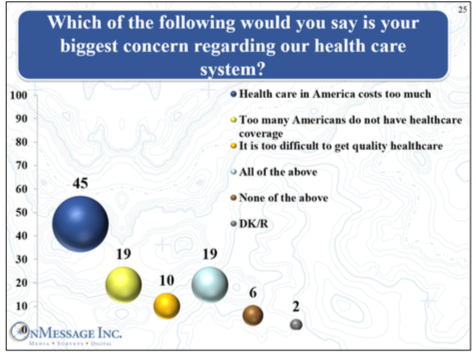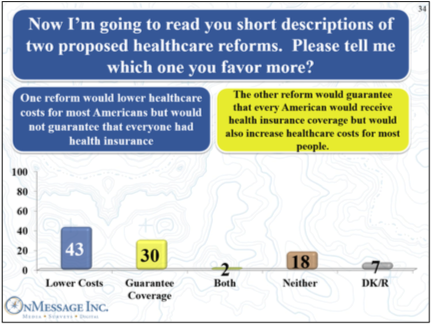On Health Care, It’s the Costs, Stupid
At his first post-election press conference Monday, President Obama attempted to sound gracious on the topic of repealing his signature health law, while simultaneously laying down a clear policy gauntlet: the number of Americans with insurance coverage under a Republican replacement.
If they can come up with something better that actually works, a year or two after they’ve replaced [Obamacare] with their own plan, and 25 million people have health insurance and it’s cheaper and better and running smoothly, I’ll be the first one to say that’s great. Congratulations.
In other words, as I noted last month, the president will happily support others’ legislation—so long as it accomplishes exactly what he wants. Ironically enough, when campaigning for the presidency eight years ago, Barack Obama campaigned on one number, but one that had nothing to do with the number of Americans with health coverage. It was $2,500—the premium reduction he promised to the average family.
Obamaspeak: ‘Lower Premiums’ Means Massive Increases
President Obama’s 2016 focus on how many people have health insurance coverage stands in stark contrast to candidate Obama, circa 2008. In the Democratic primaries against Hillary Clinton, he famously opposed an individual mandate to purchase health insurance, because “the reason people don’t have health insurance isn’t because they don’t want it; it’s because they can’t afford it.”
While then-senator Obama did not promise to achieve a certain level of health insurance coverage, he did make a very specific promise to lower premiums. As the video shows, Obama promised—over and over and over again—that his health-care plan would lower premiums by an average of $2,500 per family:
Note also that Obama promised to “lower” and “cut” premiums. That means he didn’t promise that premiums would rise by slightly less than predicted—he pledged to reduce them in absolute terms.
On any count, President Obama’s pledge lies in tatters. Since he signed Obamacare in 2010, the average employer-sponsored health plan has risen by more than $3,300 per family—from $13,770 in 2010 to $18,142 this year. Obamacare’s massive benefit mandates raised the average premium for individually purchased coverage by about 40 percent overnight, as the main provisions of the law took effect in 2014. Premiums are also set to spike on Obamacare exchanges again, with an average of another 25 percent rise for the plan year beginning January 1.
Cost Is Voters’ Top Concern
In reality, Obamacare stands as living proof that affordability matters most for health care and health insurance. While the Medicaid rolls have exploded far beyond most states’ original estimates—perhaps because the program charges no premiums to most beneficiaries—enrollment in exchange plans remains far below projections. Obamacare’s benefit mandates have so raised the cost of coverage that everyone but individuals qualifying for the richest subsidies has stayed away from the exchanges in droves.
Polling data also speaks to voters’ concern about reducing health costs. A survey conducted for America Next in February 2014 (while I served as America Next’s policy director) reveals that voters judge costs as a larger concern than universal coverage by a more than two-to one margin. In addition, by 13 percentage points voters prefer a system that lowers costs but does not guarantee coverage over a system that guarantees health insurance but increases costs:


The Media Is Out of Touch with Americans
In covering a post-Obamacare universe, most media stories in the past week have focused solely on the number of individuals with health insurance. That’s one key metric, but so are whether health insurance results in access to actual health care, whether coverage improves health outcomes, and the extent to which individuals value health insurance over other goods.
Voters care most about reducing the underlying cost of health care. Only lowering costs, not creating new ways for the federal government to subsidize them, will make health care fiscally sustainable in the long term, while increasing the number of Americans with health coverage. That’s the prime metric for judging Obamacare, a metric by which, according to its eponymous creator, it has fallen short, and the metric for judging Republican proposals to replace it.
This post was originally published at The Federalist.